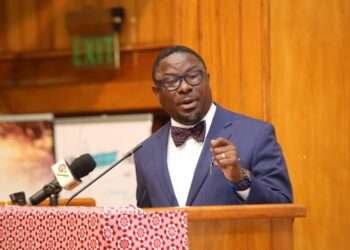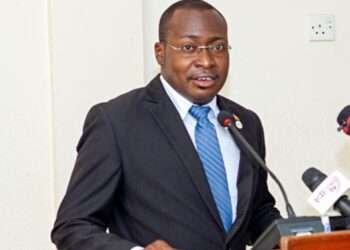Mr. Mark Aflu, a prominent Tax expert and former president of the Chartered Institute of Taxation – Ghana, has expressed worry concerning the Domestic Debt Exchange Programme (DDEP), insisting that Ghana does not need an IMF bailout and that Ghana’s economy can survive without their intervention.
Raising concerns about the DDEP, the tax expert averred that the decision to restructure government debt could be shelved because it could impact investors’ livelihoods and, in the long run, cause economic recession.
“Many of these economic difficulties can be attributed to excessive borrowing, corruption-related activities, rising inflation, the cedi’s daily weakening, and so on.
“On the issue of corruption, it should be noted that, in a letter dated 5th October 2020 from the Auditor-General to the Managing Director of GCB Bank, the Auditor-General demanded to know why an amount of Ghc 52,537,175,778.13 deposited by the Ghana Revenue Authority, which should have been transferred to the Bank of Ghana, was transferred from GCB Bank Plc into an unknown account. My question is, where has the money gone?”
Mr. Mark Aflu
According to Mr. Aflu, government could have avoided the 17th IMF bailout Ghana is currently seeking if the Finance Minister had managed the country’s debt levels well, among other things like rise in inflation and excessive spending.
Ghana, as indicated by Mr. Aflu, will struggle to secure the required IMF Management level approval by March 2023, stating that there are still outstanding issues with the Domestic Debt Exchange Programs and the yet to be commenced external debt restructuring.
“On the alternatives available to managing the economy, government should cut down 50% of its expenditure. Government should take a second look at its recurrent expenditure and do a revision on its cost items to help create some fiscal space. In doing so, the government should also consider deferring 60% of flagship projects that are putting a strain on the economy’s finances.
“To address the economy’s revenue shortfalls, the government should prioritize revenue generation by closing corruption loopholes and empowering the Revenue Authority, GRA, to work more efficiently.”
Mr. Mark Aflu
Mr. Aflu further advised the government to be prudent and financially discipline in its governance approach. He said: “Government should as a matter of urgency work with the necessary stakeholders to look at dealing with the economic quagmire we are currently in.”
Government Urged To Curb Corruption To Save The Country
More so, a senior lecturer at the University of Ghana Political Science Department, Dr. Kwame Asah Asante has said that the country will be able to forgo the IMF bailout and its conditions if the government manages corruption well.

Speaking during an interview, the Political Scientist disclosed that the government’s mismanagement of corruption is the reason we need to accept all these conditionalities from IMF for a possible bailout.
“We are so excited that IMF is going to give us close to 3 billion for starters and all that. But if we manage corruption very well, I’m afraid we will not need that money with its attendant problems and conditions. Let’s look at the issue of waste and a lot of information are available within the auditor general’s report year by year. How far have we come, and how far have we learned from them to continue to see these things in our books? It is unfortunate.
“If you look at issue of waste, in terms of projects we pursue. Projects that have little or no benefit for society and then we are in there. We undertake projects without records of stakeholder engagement, and when people raise their voices those projects become abandoned and we adjust to devising such projects. We have seen issues of misapplication of state resources. In the sense that the constitution makes it mandatory for all government that when you inherit power, any project that is done using state money you will continue.”
Dr. Kwame Asah Asante
He continued; “But there are buildings today that are languishing in the bush and that we don’t seem to care about it. We forget that state money was put into such resources. Look at the way we execute contracts in this country as if there is no supervisor of contracts that the state has awarded. We do it anyhow and people benefit from that through poor supervision and poor execution of state projects. What is worst is that we see some of these contracts ending up in judgement debt.”
Read also: Ghana Needs To Find A Better Diplomatic Way Of Handling Its Debt Relief Negotiations- Prof. Bokpin





















